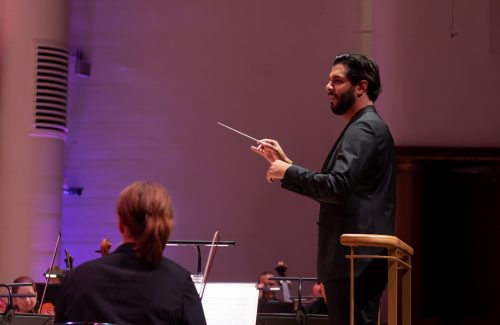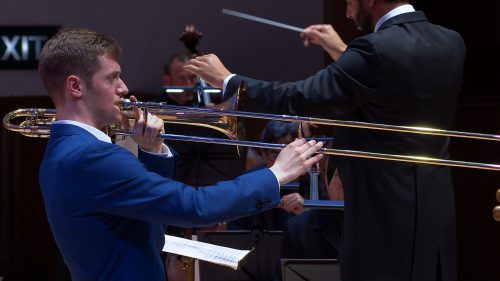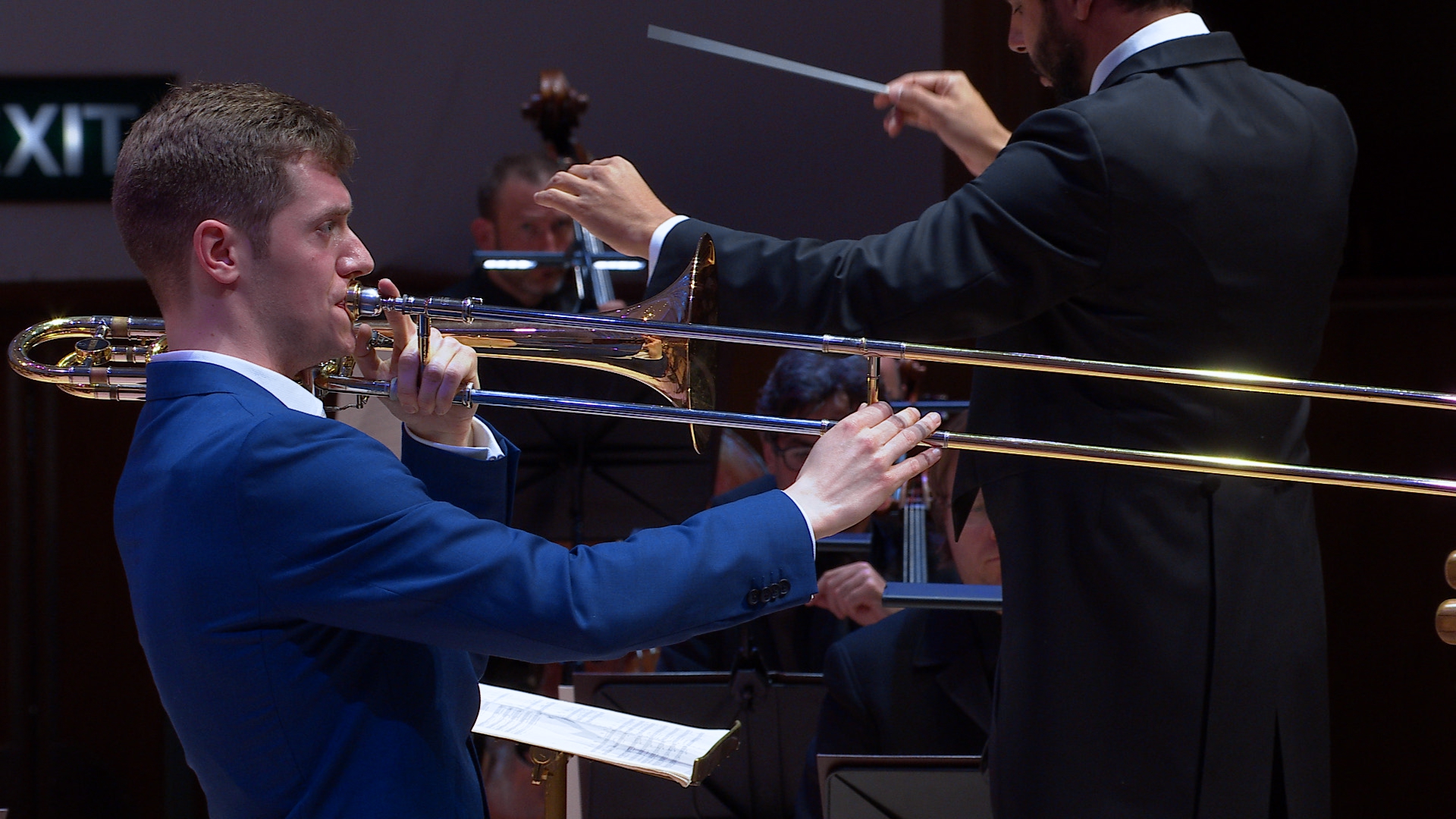 United Kingdom Stravinsky, Dani Howard, Ravel, Prokofiev: Peter Moore (trombone), Royal Liverpool Philharmonic Orchestra / Domingo Hindoyan (conductor). Concert from Philharmonic Hall, Liverpool on 17.6.2021, streaming from 29.6.2021. (CC)
United Kingdom Stravinsky, Dani Howard, Ravel, Prokofiev: Peter Moore (trombone), Royal Liverpool Philharmonic Orchestra / Domingo Hindoyan (conductor). Concert from Philharmonic Hall, Liverpool on 17.6.2021, streaming from 29.6.2021. (CC)

Stravinsky – Octet (1923)
Dani Howard – Trombone Concerto (2021, World Premiere, Royal Liverpool Philharmonic Society commission)
Ravel – Le Tombeau de Couperin (1914-17, orch. 1919)
Prokofiev – Symphony No.1 in D, Op. 25, ‘Classical’ (1917)
In his first concert as Chief Conductor Designate of the Royal Liverpool Philharmonic Orchestra (his appointment officially starts in September), Domingo Hindoyan included the world premiere of a Royal Liverpool Philharmonic commission, Dani Howard’s Trombone Concerto. The soloist was Peter Moore, for whom the concerto was written. Principal Trombone of the London Symphony Orchestra (a post he obtained at the age of 18), Moore exhibits superhuman stamina it seems: Howard’s concerto is massively demanding (not least in ending on a screaming high note) and Moore impressively overcame all its challenges.
Before the performance of the new concerto, there was an onstage discussion between Hindoyan, Dani Howard and Peter Moore. According to Howard, the intent of the concerto was to provide a piece that was ‘hugely joyful, colourful, explosive’. Written during lockdown and with an awareness that the premiere would take place as we come out of lockdown, it includes a ruminative second movement on the roles of those in society who normally go unnoticed but who realise they have something to contribute which is special – the third movement is their realisation that they can do something about that. Cast in three movements (the composer loves odd numbers apparently), Howard puts her own stamp on this traditional form. Peter Moore spoke of his excitement at tacking this new piece, Dani Howard has been commissioned by the RLPO twice before, but this is her first concerto (and her longest symphonic work to date); the previous pieces were Argentum and Coalesce.
‘Realisation’, the first panel, begins with a hum of activity clothed in warm harmonies and scoring. We hear an aspect of the trombone not always spotlit – its ability for a long cantabile line. Moore clearly has complete control of all registers, as some of Moore’s faster passages traverse the gamut of the instrument’s range quickly. The music is approachable in a post-minimalist way (sometimes John Adams came to mind). Howard’s ear for timbre is acute – lovely echoes of the soloist’s line from stopped horn and muted trumpet seemed perfectly judged.

The concerto is not just demanding in terms of range, stamina and virtuosity; it also asks the player to perform multiphonics (basically creating chords by playing one note through the instrument and singing above it to activate harmonics). In all of this Moore triumphed; particularly noteworthy from the perspective of Howard’s keen ear was the way the open tones of the soloist were prolonged in a kind of echo effect by the orchestral, muted, trombone – a lovely shift of sound emphasis on one note and another aspect of Howard’s timbral awareness. The slow movement is clearly an aria for the solo instrument – more of that cantabile with which the concerto opened, here coupled with a real love for luscious sonorities and occasionally garlanded by a solo violin. The finale is a riot of colour and energy, culminating in a final triumphant high note for trombone. Moore’s lip is clearly steel-forged, his entire range as solid at the end as at the outset.
Howard’s concerto is a work of substance and frequent beauty. It also is part of a busy summer for the composer: she will premiere works at the Three Choirs Festival and has also provided music for an immersive audio tour of Barcelona’s iconic Casa Batlló. (Howard’s own website (below) includes links to hear other of her pieces.)
Stravinsky’s Octet began the concert, eight socially distanced players in a semicircle weaving magic in this soft-grained account. The pair of bassoons in particular stood out in the opening (some truly beautiful sounds) before the more martial main theme came into focus. The underling lyricism of the opening to the second movement, tempered by superbly articulated staccato chords, stood in high contrast to the scamperings that followed. This movement is a Theme with Variations; all credit to the rapid-fire bassoons here and the clarion trumpet, and to Hindoyan for finding the spirit of the dance (remember there’s a waltz, a march and a can-can in there). The bassoon-led finale, based on the rhythm of a khorovod (Russian folk dance), is beautifully unpredictable, the Liverpudlian players relishing every moment of buoyancy and, at the very close in particular, humour. A fine performance.
Ravel’s Tombeau de Couperin (the composer orchestrated four of the original piano set of six movements, omitting the Fugue and the concluding Toccata) emerged as golden, gentle and beautiful. The Liverpool orchestra is playing at a consistently high level for Hindoyan, and the adjustment to Ravel’s rarefied soundworld after the rather more grounded Howard was superb. Finding a nice spring in the dotted rhythms of the ‘Forlane’ (and a real sense of veiled mystery too), that movement acted to complement the ‘Menuet’ (perhaps a touch too sleepy) before the bright white light of the ‘Rigaudon’ brought much delight in its wake.
Prokofiev’s First Symphony remains one of that composer’s best-known and best-loved works. With its Haydnesque leanings couched within Prokofiev’s characteristically acidic harmonies, it balances out Stravinsky’s similarly neo-classical octet that launched the concert. Hindoyan found much detail in the first movement, and much suavité in the ensuing Larghetto, the latter a movement full of human warmth and bonhomie (and all credit to the Liverpool strings for negotiating Prokofiev’s perilously high writing so beautifully). The spirit of the dance was certainly there in the Gavotte – it could easily have been an excerpt from a Prokofiev ballet – before the finale effervesced its way to the concert’s close.
A year ago, it was announced that Hindoyan would succeed Vasily Petrenko at Liverpool; he is also Principal Guest Conductor of the Polish National Radio Symphony Orchestra. On 6 September this year, he will lead his orchestra at the BBC Proms in a programme of Dvořák (Cello Concerto, soloist Sheku Kanneh-Mason), former BBC Young Composer winner Grace-Evangeline Mason (The Imagined Forest, a co-commission between the RLPO and the BBC), Richard Strauss’s Don Juan and the Hindemith Symphonic Metamorphosis of Themes by Carl Maria von Weber. On present evidence, it promises to be a great night.
Colin Clarke
Websites for Dani Howard: Howard Coll (Collaborative Collective Collection) and Dani Howard, Composer.
